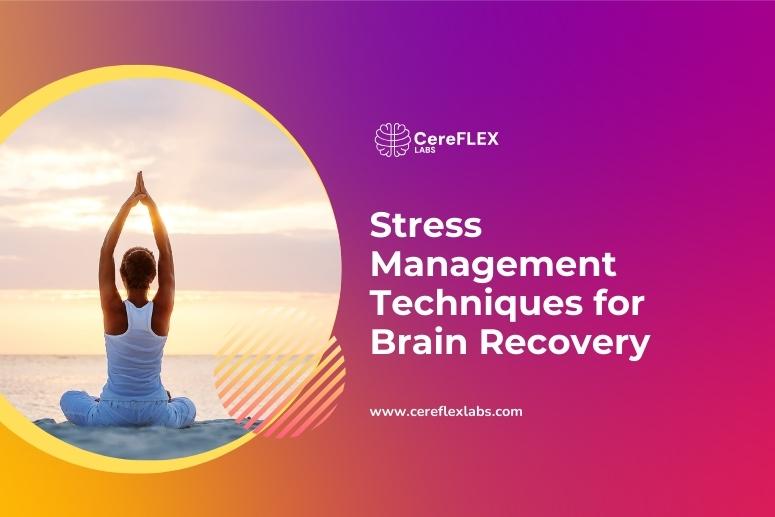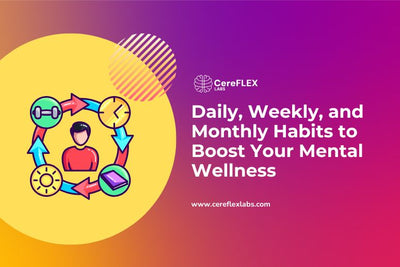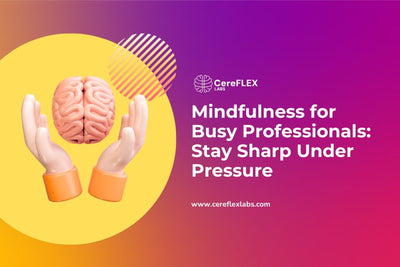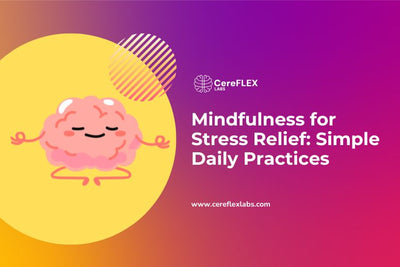Recovering from a brain injury requires addressing both the mind and body. Stress—whether stemming from the injury itself or the challenges that come with it—can slow recovery and hinder the brain's healing process.
For athletes recovering from concussions, seniors working to preserve their cognitive abilities, and anyone dealing with brain injuries, effectively managing stress is key.
By reducing stress, you can create a supportive environment for brain health, memory, and neuroplasticity, all of which contribute to a faster and more successful recovery. Understanding how stress impacts healing and adopting effective coping strategies can significantly enhance your recovery journey.
The Impact of Stress on Brain Recovery
While stress significantly affects brain recovery, it’s also important to understand the underlying causes of brain injuries and the different causes of brain injuries that people experience.
Stress can slow down the brain's healing process by disrupting crucial functions like neuroplasticity and the hippocampus. Long-term stress increases cortisol levels, which can limit the brain’s ability to heal, form new connections, and regain cognitive function. Therefore, managing stress is essential for effective recovery.
Neuroplasticity
Neuroplasticity refers to the brain's ability to change and form new neural pathways. These pathways, such as those connecting the hippocampus and amygdala, can be damaged by stress, though this damage is not always permanent. The brain and body are capable of healing and adapting.
Neuroplasticity plays a critical role in brain injury recovery by allowing the brain to regain lost functions. It does this by strengthening existing pathways or creating new ones.
Research from the Proceedings of the National Academy of Sciences (PNAS) indicates that young adults can recover from stress more effectively than older adults, as age affects the brain's ability to repair or form new neural connections. However, interventions to reduce stress—such as regular exercise, socializing, and having a sense of purpose—can help promote neuroplasticity, regardless of age.
Long-term stress, however, can hinder neuroplasticity. Prolonged exposure to stress causes the body to produce high levels of cortisol, the primary stress hormone, which impedes the brain's ability to form new neural connections. This can slow down recovery and potentially contribute to memory and learning difficulties.
Hippocampal Function
The hippocampus is a key brain region involved in memory and learning. Chronic stress raises cortisol levels, which can damage the hippocampus and negatively impact cognitive functions such as memory and thinking.
Studies on both humans and animals have shown that chronic stress alters neuron structure, impedes the growth of new neurons, and even reduces the size of the hippocampus.
Maintaining hippocampal health is vital during brain recovery, as it is essential for storing and processing memories necessary for healing.
How Chronic Stress Physically Rewires Your Brain
Acute stress is a short-term response to a specific event, and it typically subsides once the issue is resolved. It helps the body recover and regain balance. However, chronic stress lasts much longer due to ongoing issues, such as financial problems, work stress, or relationship conflicts. Chronic stress prevents the body from relaxing and can lead to long-term inflammation.
Chronic Stress and Brain Inflammation
Stress triggers inflammation when the immune system is activated. In the brain, microglia are responsible for maintaining balance and responding to threats. Normally, inflammation aids recovery, but when stress is prolonged, inflammation can persist too long. This ongoing inflammation from chronic stress can slow recovery and contribute to brain health issues.
Impact on Memory and Learning
During times of stress, the brain activates the "fight or flight" response, releasing hormones like cortisol and adrenaline. While this is useful in emergencies, chronic stress leads to sustained inflammation that harms memory and cognitive function. Over time, this chronic inflammation makes it harder for the brain to recover and perform well, impairing both memory and learning abilities.
Stress and Neurodegenerative Diseases
Chronic stress-induced inflammation can accelerate brain aging and increase the risk of neurodegenerative diseases like Alzheimer’s and Parkinson’s. Persistent inflammation weakens neural connections and may cause earlier cognitive decline, making the brain more vulnerable to these conditions.
What are effective coping strategies during brain recovery?
Managing stress during brain recovery is crucial for healing and supporting cognitive function. Using stress-reducing strategies can enhance brain flexibility, improve mood, and accelerate recovery. Here are some effective coping strategies:

Mindfulness and Meditation
Mindfulness and meditation are powerful tools to reduce stress. They promote awareness of the present moment and encourage relaxation. Practicing these techniques regularly can help the brain recover, improve adaptability, and support emotional regulation—key factors in recovering from a brain injury.
Physical Activity
Moderate exercise is vital for brain health. It reduces stress and enhances mood by releasing endorphins. Activities such as walking, swimming, and yoga help the brain adapt and recover, supporting both physical and mental well-being.
Establish a Daily Routine
Creating a structured daily routine can help reduce stress during recovery. Routines provide predictability, which can alleviate anxiety and prevent feelings of disorganization.
Tips for creating a routine:
- Break your day into smaller, manageable parts, with rest periods between activities.
- Focus on important tasks and avoid multitasking to prevent overwhelm.
- Schedule regular breaks to avoid mental and physical fatigue.
A consistent routine helps you regain a sense of control, making your day less stressful and more productive.
Social Support
Maintaining strong social connections is essential during recovery. Support from family, friends, or peers helps reduce feelings of isolation and provides emotional stability. Regular social interactions can boost mental health, promote well-being, and assist with stress management throughout the recovery process.
Professional Support
Seeking guidance from healthcare professionals, such as neuropsychologists and rehabilitation therapists, can significantly improve stress management during recovery. These experts help address specific challenges, enhance brain healing, and ensure expert care throughout your recovery journey.
Accepting Thoughts and Feelings
Stress often arises when we believe we should feel or think differently. There is no “right” or “wrong” way to feel or think; your experience is valid. By accepting your thoughts and emotions instead of fighting them, you can reduce stress.
Take time each day to acknowledge what you're thinking or feeling without judgment. All emotions matter, and accepting them can help you cope better. If you have distressing thoughts that may lead to harm, seek help immediately.
Prioritize Sleep and Rest
Sleep is essential for brain recovery, yet it often becomes disrupted during this time. Lack of sleep can increase stress, irritability, and cognitive difficulties. Maintaining a sleep routine can help you rest better and recover faster.
Tips for better sleep:
- Develop a calming bedtime routine by limiting screen time, avoiding caffeine, and using relaxing scents like lavender.
- Go to bed and wake up at the same time every day, including weekends.
- Limit daytime naps to maintain your natural sleep-wake cycle.
- Use blackout curtains, white noise machines, or eye masks to create an optimal sleeping environment.
Focusing on your sleep allows your brain to recharge and improves your ability to cope with recovery challenges.
Try Adaptogens
Adaptogens can help reduce stress during brain recovery. These natural substances support the body in managing stress and restoring balance, particularly in the nervous and endocrine systems. By assisting the body in responding to stress, adaptogens can lower cortisol levels, boost mood, and support brain health.
Managing stress is vital for brain recovery because it aids neuroplasticity, cognitive function, and emotional well-being. Adaptogens like ashwagandha, rhodiola, and holy basil can reduce stress and anxiety, improve cognitive function, and promote better sleep—factors that enhance recovery.
For additional support with stress management, exploring calmness through nootropics, particularly adaptogens, may be beneficial.
Before using adaptogens, especially after a brain injury, it’s essential to consult with a healthcare professional to ensure they are safe and suitable for your condition.

Eat a Healthy Diet
A balanced diet can help your body better manage stress. Be mindful of your food choices and aim to limit sugar, caffeine, and alcohol. Regular meals containing protein, vegetables, grains, and fruit provide the energy needed to handle stress. Also, stay hydrated by drinking plenty of water.
Pay Attention to Your Emotions
Be aware of your emotions and take note if you feel overly anxious or depressed. Recognizing these signs early can help you seek help from a therapist or doctor before they negatively impact your life.
Promote Your Brain Health with Cereflex Labs: AM & PM Brain Formulas
To support your brain health, consistency is key. CereFLEX Labs offers AM and PM Brain Formulas, a straightforward supplement plan that boosts cognitive function and memory, day and night.
AM - Brain Morning Formula: Start your day with the AM Brain Morning Formula. This formula helps improve brain function, memory, and blood flow. It’s packed with essential vitamins and minerals that enhance mental clarity, keep you focused, and protect your cells from damage caused by free radicals. It’s the perfect way to kickstart your day and support long-term brain health.
PM - Cognitive Support Evening Formula: End your day with the PM Cognitive Support Evening Formula. This formula helps your brain relax overnight. It delivers important nutrients and antioxidants that reduce stress and support cognitive function, ensuring your brain gets the rest it needs to recover.
The formulation of these AM and PM Brain Formulas is backed by research into the effectiveness of nootropics on brain health, ensuring that key vitamins, minerals, and antioxidants are provided for optimal cognitive support.
Together, these formulas offer complete support for your brain, helping improve memory, boost cognitive function, and promote overall well-being. With an easy-to-follow plan, CereFLEX Labs makes maintaining brain health simple and effective.
Keep your brain sharp and healthy with these AM and PM formulas, designed for adults who want to enhance their cognitive abilities and improve their overall health.
Conclusion
Managing stress is a crucial part of brain recovery, as it directly affects neuroplasticity, memory, and cognitive function. By integrating strategies such as mindfulness, physical activity, and social support—along with professional guidance—you can create a comprehensive recovery plan.
For additional support, CereFLEX Labs’ AM/PM Brain Formulas provide essential vitamins, minerals, and antioxidants to enhance cognitive function, improve memory, and promote overall brain health. Combining effective stress management techniques with these supplements can help optimize your brain’s healing process and long-term performance.






